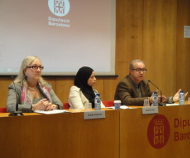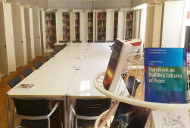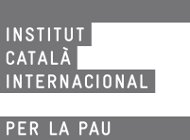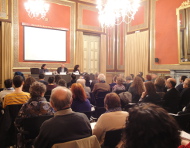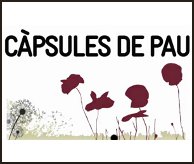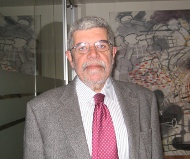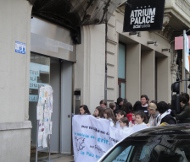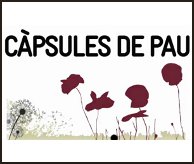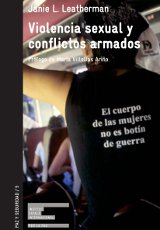On Tuesday, November 3, the International Catalan Institute for Peace (ICIP) held the international conference Women, Peace and Security: 15 years of UN Resolution 1325 at the Pati Manning in Barcelona. The aim of the conference was to reflect on progress and obstacles in the international agenda on Women, Peace and Security, fifteen years after Resolution 1325 was adopted by the UN Security Council.
The conference brought together women activists and peacebuilders from around the world, who presented the challenges and shortcomings of Resolution 1325 in the present context and in different countries, such as Colombia, Spain and Bosnia.
The inaugural lecture was given by the Canadian activist residing in Libya, Alaa Murabit, founder of the organization The Voice of Libyan Women and member of the advisory group for the global study on Resolution 1325. Murabit defended the importance of Resolution 1325, especially the need to put it into practice to ensure women’s participation in political life, and, specifically, in peace negotiations. “1325 opened the door to changes, but that is no longer enough because we do not have the structural capacity to put it into practice. We need a change in mentality, and we need to renew the institutions of power, support global disarmament and justice, and institutionalize the participation of women in the international agenda,” she stated.
In the various debates, speakers offered a bittersweet account of the impact that Resolution 1325 is having fifteen years after its adoption, and they highlighted the need to give women more spaces to enable peacebuilding. They also called for more political commitment by states to implement Resolution 1325: the allocation of more funds to Resolution 1325 action plans and the establishment of a timetable for their implementation.
The closing conference was given by ICIP director Tica Font, and the director of the Catalan Agency for Development Cooperation (ACDD), Marta Macias, who asserted the need to better disseminate Resolution 1325 and to continue working, in institutions, to give women a voice. “We feel unsatisfied with the implementation of 1325,” said the director of ICIP.
The conference Women, Peace and Security: 15 years of UN Resolution 1325 coincides with the #DONAVEU1325 campaign, promoted by the ACDD to disseminate the international agenda on Women, Peace and Security. As part of this campaign, the platform www.donaveu1325.cat has also been created.
At the same time, ICIP will publish a new issue of the electronic magazine Peace in Progress in November, dedicated to the fifteenth anniversary of Resolution 1325. The magazine Peace in Progress is published quarterly in Catalan, Spanish and English.
Author: whads
The ICIP Library has moved to a new location
Since February 16th, the ICIP Library is located on the first floor of Carrer Tapineria, 10, also in Barcelona. The Library opening hours are the same: Monday to Thursday from 9 am to 6:30 pm and Fridays from 9 am to 2 pm.
The ICIP Library is a center specializing in peace culture, security and conflicts that aims to enable and encourage research in these areas, and it has become a center of reference in its field in Catalonia. The Library offers support to ICIP and to its researchers and experts in the field of peace studies. It is part of the network of specialized libraries of the Generalitat and is in permanent contact with similar institutions and centers from around the world.
New call for research grants
ICIP has launched a new call for proposals for peace research grants (R-ICIP 2014-2015) through the Agency for the Management of University and Research Grants (AGAUR). These grants are aimed at universities of the Catalan university system or public and private non-profit centers of Catalonia that have research as one of their main activities. They are intended for original and unpublished peace research work leading to new results in the theoretical field or in the practical application of appropriate solutions that increase effectiveness and efficiency in conflict management.
Grant applications can be submitted until March 3, 2015.
Truth, justice, reparation and non-repetition: the pillars of transitional justice
The International Catalan Institute for Peace (ICIP) and Democratic Memorial have celebrated the Fourth International Colloquium “From Past to Future: Memory and Transition Processes”. In this event, various transitional processes that have taken place around the world since World War II were analyzed.
The colloquium, featuring twenty speakers and a hundred attendees, was opened on Monday, November 30, in a ceremony chaired by the Minister of Governance, Meritxell Borràs, ICIP president Rafael Grasa, and the director of Democratic Memorial, Jordi Palou-Loverdos. The opening lecture was given by Maria Clara Galvis, a member of the UN Committee Against Forced Disappearances, who defended the role of the United Nations “as a guarantor of the establishment of truth, justice, and the reparation of past abuses” and stressed the need to empower victims of conflict as rights holders and to oblige states to investigate crimes and human rights violations.
Transition strategies
On December 1 and 2, several round tables discussed the various strategies, both judicial and non-judicial, that characterize transition processes, whether from dictatorship to democracy or from violent conflict to peace. First of all, Professors Ricardo Martín de Guardia and Alberto Pellegrini dealt with post-World War II transitions (the cases of Germany, Italy and Japan, and the situation of collaborationist countries, such as France, Belgium or Holland); Professors Claudia Jiménez and Rosa Ana Alija focused on the principles of the Nuremberg and Tokyo tribunals, which have marked the essence of international criminal law, and the trials against Nazism; and Professors José María Faraldo and Marició Janué dealt with the political transitions in Eastern European countries after the fall of the Berlin Wall, in this case marked by the consolidation of democracy, the acceptance of a capitalist economy and European integration.
In this first part of the colloquium, the post-Cold War international system was also dealt with, by Professor Rafael Grasa; the current functioning of the International Criminal Court, by the prosecutor Fabricio Guariglia; the International Tribunals for the former Yugoslavia and Rwanda, by the criminal law expert John Philpot; universal justice in Spanish courts, by Professor Manuel Ollé; and the international courts of opinion, by Professor Antoni Pigrau.
Truth Commissions
The second part of the colloquium was focused on the analysis of Truth Commissions as a mechanism of transitional justice: their ability to transform a conflict, clarify the facts, recognize responsibilities and work for forgiveness and reconciliation. “Truth commissions have very high expectations and often generate frustration,” according to both Mark Freeman, director of the Institute for Integrated Transitions, and Ferriol Soria, director of the Ernest Lluch Foundation, who focused on the case of South Africa. In addition, Tunisian journalist and member of the Truth and Dignity Commission of Tunisia, Seif Soudani, analyzed the democratic transition in Tunisia.
The colloquium also focused on processes of justice, preservation of memory and reparation for victims in the Basque Country and Colombia, with presentations by Aintzane Ezenarro, director of the Institute for Memory of the Basque Country, and María Camila Moreno, of the International Center for Transitional Justice. Both speakers emphasized the need for “addressing memory from a critical look at the past” and the fact that “memory corresponds not only to the victims, but to society as a whole.”
Memory and justice in Catalonia and Spain
Finally, the colloquium discussed the democratic transition in Spain and Catalonia, with Professor Borja de Riquer; Argentine judicial action regarding Franco-era crimes, with Professor Anna Messuti; and the possibility of establishing a Truth Commission on the crimes of the Civil War and the Franco regime, in a round table with lawyers Antoni Cruanyes and Magda Oranich, and Professors Josep Maria Solé i Sabaté and Assumpció Malgosa.
Professor Borja de Riquer was very critical of public policies of memory at the state level: “In a democratic state, a policy on the dissemination of the past is necessary so that previous injustices are not ignored. And the political balance sheet of Spanish public policies of memory is objectionable, with the exception of Catalonia.” In this regard, De Riquer praised the work carried out by Democratic Memorial.
De Riquer defended “the political necessity of creating a Truth Commission in Catalonia,” as did the other speakers. “Everyone who has fought for freedom and democracy has the right to memory,” said Josep Maria Solé i Sabaté. “The only option for the future is to know what happened and go over all the episodes rigorously,” said Assumpció Malgosa. Meanwhile, Josep Cruanyes explained that a Truth Commission in Catalonia “is especially necessary considering the way the Spanish transition was done,” and Magda Oranich recalled that “there are many ways to compensate the families of victims of the Franco regime in a society that wants to be just.”
ICIP awards the Women’s International League for Peace and Freedom
The Governing Board of the International Catalan Institute for Peace has unanimously decided to grant the 2014 ICIP Peace in Progress Award to the Women’s International League for Peace and Freedom (WILPF) “for its century-long involvement in the work of women for peace, its commitment to disarmament, the defense of human rights and the persistence to obtain the recognition of the role of women in the building of peace”.
The Women’s International League for Peace and Freedom was a pioneer in the creation of an internationalist pacifist feminism and is a model for all initiatives of women for peace.
ICIP’s Peace in Progress Award is granted annually and consists of public recognition, a sculpture created by the Nobel Peace Prize winner, artist and activist Adolfo Pérez Esquivel, called Porta del Sol, and a financial prize of 4,000 euros. The award ceremony will take place during the first trimester of 2015 in Barcelona.
100 years of struggle for peace and disarmament
The origins of the Women’s International League for Peace and Freedom date back to 1915. During the First World War, 1,200 women from twelve different countries celebrated the First International Congress of Women in The Hague to protest against the war, elaborate a peace strategy and call for the immediate mediation of neutral countries. That congress was the starting point for an internationalist and pacifist feminism, and led to the founding of the League, the oldest and most persistent women’s organization in its commitment to peace.
WILPF’s founding objectives were –and still are– “”to bring together women of different political views and philosophical and religious backgrounds determined to study and make known the causes of war and work for a permanent peace.”
At present the League is headquartered in Geneva and New York and is present in 30 countries. Throughout its history, WILPF has sent peace delegations to, among other places, the Balkans, Palestine, Mexico, Egypt, Cuba, Haiti, Vietnam, Israel, Chile, Jordan, Lebanon, China and Iraq. It has also organized meetings and exchanges of experience between women of countries and communities in conflict, for example, Arab and Jewish women in Israel (1958), women from the US and the USSR (1961) or from the US and Vietnam (1971).
The organization also played a key role in the elaboration of UN Security Council Resolution 1325 (2000) on women, peace and security, or of the Arms Trade Treaty, and is a member of various networks and international campaigns.
Two of its presidents, Jane Addams (1931) and Emily Greene Balch (1946) have been awarded the Nobel Peace Prize.
In order to carry out its work, WILPF currently has various programs: Reaching Critical Will (a disarmament program that monitors multilateral disarmament processes, conducts research, and facilitates the participation of civil society in international meetings and conferences); Peace Women (a women, peace and security program that promotes the participation of women in peacebuilding and conflict resolution processes); and Human Rights (a program that works on integrating issues of peace and security with women’s human rights).
Previous recipients of the ICIP Peace in Progress Award
The ICIP Peace in Progress Award has reached its fourth edition this year. The first edition of the award, in 2011, recognized the struggle of conscientious objectors and “insubmisos” (people who refuse to do military service or any substitute social work) represented by Pepe Beunza, the first conscientious objector to compulsory military service for ideological reasons in Spain.
In 2012, the ICIP Peace in Progress Award was granted to five Madres de Soacha (Mothers of Soacha) for their work in favor of peace and human rights in Colombia. With this award, ICIP wanted to recognize their courage and perseverance in pursuit of truth, justice, and reparations for the killings of their children by the State security forces, and other cases of extrajudicial executions known as “false positives.”
In 2013, the ICIP Peace in Progress Award was granted to the ex-general born in Belgrade, Jovan Divjak, for his courage in the defense of Sarajevo during the Balkans War and his work in favor of the victims of that conflict.
Previously, in October 2011, ICIP granted an extraordinary edition of the award to the Parliament of Catalonia for representing the continuity and legacy of the institutions “Pau i Treva” and “Consolat de Mar”.
What is Peace to Thubten Wangchen?
A new video of the project ‘Peace Capsules’, coproduced by ICIP and Col•lectiu Contrast, has been published this week on the ICIP website. It is a short one minute long video entitled ‘What is Peace to Thubten Wangchan? ‘ and in which Wangchan, founder of the Tibet House in Barcelona, considers what peace means to him. The video is accessible both on the ICIP website and on the ICIP Youtube Channel .
Until the 21st September 2014, International Day of Peace, ICIP will publish a new video capsule each week. Each capsule will count with the participation of an activist, actor or academic who will think of what peace means to him/her. The aim of the project is to compile different approximations to the concept ‘peace’ on the ICIP web site.
Colombia After Violent Conflict: Challenges and Scenarios for the Construction of Peace
Thank you, Alfons!
Our friend Alfons Banda, vice-president of ICIP, founder of Fundació per la Pau (Foundation for Peace, now FundiPau), tenacious campaigner for peace, promoter of the importance of peace culture and of the leading role of public opinion in the fight for justice has just passed away. And he has done so today, the day we commemorate the death of Gandhi and the School Day of Nonviolence and Peace, two things he dedicated a lot of effort to for decades.
He died peacefully, after a short illness that did not respond well to treatment, with a serenity, dignity and courage to come to terms with his final days, guaranteeing human qualities that captivated and were admired by all.
Now we are overcome by sorrow although we can imagine that you are already chatting away with Gandhi, Joan Gomis or Sean McBride, all of whom you so much admired. But we also feel a great responsibility to continue your work, follow your lead and promote your legacy. And we will; we will do what you affectionately told us to do at the last ICIP Board Meeting: “I know that my convictions, ideas and actions will persist.”
We will miss your smile, of course, and we will miss your ability to combine conviction and analysis, which is rare. And we will also miss your firmness regarding minimal demands. You always said that dialogue and seeking out the other was necessary, but, like Walzer, the minimal demands, the red lines, had to be impassable and known at the beginning of the debate or dialogue. We will miss your constant perseverance, your infinite and tireless tenaciousness, without which ICIP would never have come into existence. But we are left with many, many things: memories, writings, gestures, examples, networks…
We will especially remember your demand to enlighten the shadow of peace, the title of your blog that you – always the professor, of course – clarified: peace is blurry, like the shadow of a ship in an image… vague outlines that fade away. What is needed, what you did with your blog, is to enlighten the shadow, to clarify the image of peace, to show its beauty and bring it to life.
We will continue to pursue, with your absent presence, the shadow of peace… so that shadow and reality can finally meet and become one.
Thank you, Alfons!
Rafael Grasa, President of the International Catalan Institute for Peace.
ICIP celebrates the School Day of Nonviolence and Peace (DENIP) with the students of Casp School
This year ICIP has wanted to celebrate the School Day of Nonviolence and Peace (DENIP) with students and teachers at the Casp-Sacred Heart of Jesus School of Barcelona.
A group of children, accompanied by their teachers, has come to ICIP’s main office to deliver their drawings with wishes for peace.
They have also had the opportunity to speak with ICIP director Tica Font in the Institute’s auditorium.
This was one of the activities carried out by ICIP to celebrate DENIP on January 30, the day the assassination of Mahatma Gandhi is commemorated.
ICIP technicians also gave talks on peace-related issues in various schools to commemorate this day. And in the afternoon, the ICIP director participated in the ceremony in honor of Gandhi, organized by the Catalan Federation of NGOs for Peace, Human Rights and Development Cooperation, that took place in the Gandhi Gardens, in the Poblenou district of Barcelona.
Antoni Pigrau a jurist on the Permanent Peoples’ Tribunal
Antoni Pigrau, ICIP board member and Professor of Public International Law and International Relations at the URV, participated as a jurist on the Permanent Peoples’ Tribunal in the session on the Canadian mining industry, which took place from May 29 to June 1 in Montreal.
This was the 40th session of the Permanent Peoples’ Tribunal (PPT), a court founded in Italy in 1979 by the lawyer and senator Lelio Basso. In this session, some fifteen victims and experts from Latin America denounced, before a panel of jurists consisting of public figures from various countries, the human rights violations and environmental damage caused by Canadian mining companies supported by the government of Canada.
Canada is the most important player in the global mining industry due to its laws, its taxation system and its foreign policy, which favor this sector: 75 percent of mining companies have their headquarters there and 60 percent are quoted on the Toronto Stock Exchange. Nevertheless, mining megaprojects are a major source of tension: in Latin America, they have resulted in around 200 social conflicts, almost 90 of which involve Canadian companies.
The Tribunal examined the role and responsibility of mining companies and the Canadian state in human rights and environmental violations in Latin America, specifically in the emblematic cases of the following projects: Pascua Lama (Barrick Gold) in Chile and Argentina; Escobal (Tahoe Resources) in Guatemala; San Martín (Goldcorp) in Honduras; and Payback (Blackfire Exploration) and La Platosa (Excellon Resources) in Mexico.
What is Peace to Eulogio Dávalos?
A new video of the project ‘Peace Capsules’, coproduced by ICIP and Col•lectiu Contrast, has been published this week on the ICIP website. It is a short one minute long video entitled ‘What is Peace to Eulogio Dávalos ?’ and in which Dávalos, the president of the Salvador Allence Center in Barcelona, considers what peace means to him. The video is accessible both on the ICIP website and on the ICIP Youtube Channel .
Until the 21st September 2014, International Day of Peace, ICIP will publish a new video capsule each week. Each capsule will count with the participation of an activist, actor or academic who will think of what peace means to him/her. The aim of the project is to compile different approximations to the concept ‘peace’ on the ICIP web site.
Violencia sexual y conflictos armados, by Janie L. Leatherman
Sexual violence as a weapon of war has been absent for some time in the analysis of armed conflict even though it has been incorporated into the peace and security agenda in recent years.
In the book Violencia sexual y conflictos armados (Sexual violence and armed conflicts), Janie Leatherman analyzes how the conditions that contribute to sexual violence in armed conflicts are created, and what the consequences and possible responses are. The author examines how the structures of the global political economy are involved in war and in the acts of sexual violence that it entails. Her main argument is that a system of patriarchal domination and a shared vision of hegemonic masculinity encourage and contribute to the existence of this type of violence. She focuses her criticism on globalized corporations that obtain profits from countries devastated by war and thus also from victims of sexual violence. The book also proposes strategies of prevention and protection, and programs to support the rehabilitation of survivors and their communities.
This book represents a very important contribution to the analysis of this serious violation of the human, sexual and reproductive rights of women in contemporary armed conflicts.
The author
Janie L. Leatherman is Professor of Politics and International Studies at Fairfield University. Her research encompasses conflict early warning and prevention, conflict transformation and peacebuilding. Lately, her research has focused on the global political economy of sexual violence in armed conflicts and its gendered dimensions.

